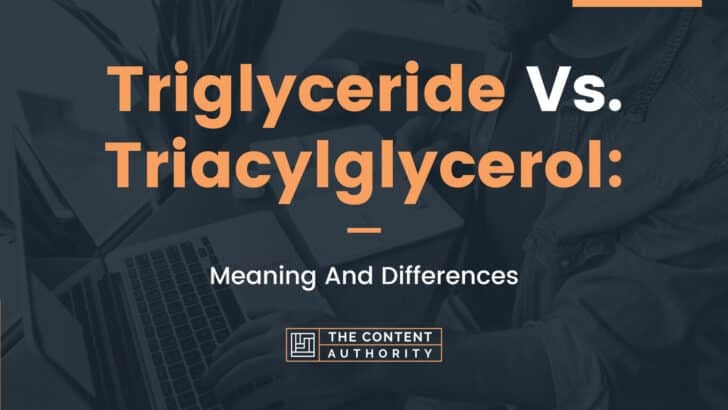If you are not into biological sciences, especially applied biology or biochemistry, you will get confused when you come across triglyceride and triacylglycerol. So, which of these words represents a type of lipid? Are they similar words?
Use triglyceride and triacylglycerol to describe lipids stored in plant and animal bodies. Triglycerides are natural lipids made of a glycerol backbone and three molecules of fatty acids. On the other hand, triacylglycerol is the chemical name used when referring to triglycerides.
It’s interesting to learn and understand biological terms. This post will allow you to have a detailed overview of triglyceride and triacylglycerol. At the end of the article, you should find it easy to define each word and apply it in appropriate contexts. Let’s explore!

Definitions Of Triglyceride And Triacylglycerol
You cannot apply scientific or biological terms if you don’t know what they mean. You can’t even guess the meaning of these words if you haven’t researched what they are all about. That said, here are the meanings of triglyceride and triacylglycerol are showcased in different books, journals, and publications.
Definitions Of Triglyceride
The simplest definition of triglyceride is a type of fat that is stored in the body.
Triglycerides come from daily foods and dietary fats. Also, the oils, butter, and margarine that people consume supply the body with more triglycerides. If that’s not enough, some carbs get converted into triglycerides whenever you consume them in excess.
Simply put, a part of the food we eat gets turned into triglycerides and stored to provide energy later on. Note that excess triglycerides aren’t healthy. They quickly lead to conditions like stroke and heart disease. Your doctor will perform a triglyceride level analysis to determine whether you exceed the required amount.
Definitions Of Triacylglycerol
Triacylglycerol is a chemical name for natural lipids made of a glycerol backbone and three units of fatty acids.
Glycerol, also referred to as glycerine or glycerin, consists of three carbons and hydroxyl groups. These groups link up with a fatty acid through triester linkages, forming a triacylglycerol.
That means triacylglycerols vary based on the fatty acid they link up with. Note that one molecule of glycerol can combine with three molecules of a single fatty acid or even more.
Triacylglycerols take up a bigger percentage of all the lipids in the human body. It’s because they are the most plentiful in dietary fats.
So, why triacylglycerol and not trilglycerol?
It’s because of the acyl group. It’s positioned where the fatty acid links up with the oxygen in glycerol. Acyl groups take up the -yl at the end.
How To Properly Use Triglyceride And Triacylglycerol In A Sentence
If you quickly search for the word triglyceride in your dictionary, you’ll quickly find it. However, some don’t include the term triacylglycerol. It’s not because the word doesn’t exist. The reason is most dictionaries don’t include scientific names.
Let’s now look at how you can use these two words in your sentences.
How And When To Use The Word Triglyceride
The word triglyceride doesn’t have multiple meanings. It only applies in scientific or biological contexts to refer to a group of lipids (fats).
In your various contexts, use this term as a noun to refer to the following:
- Fat-soluble compounds
- An ester made of glycerol and three fatty acids
- Naturally occurring lipid
- Triacylglycerols
How And When To Use The Word Triacylglycerol
Triacylglycerol is probably more popular than triglyceride because most organic chemistry and biochemistry contexts use this word. In food manufacturing industries, they also prefer to use this word in the descriptions of the products they sell, especially butter or oils.
Use the term triacylglycerol as a noun. The word will mean the following things:
- The most abundant fats in vegetables and animals
- Neutral fats
- Triglycerides
- Triacyl glycerides
Triglyceride Vs. Triacylglycerol: Are These Words Related?
The straightforward answer is yes! The evident connection is that both words have glycerol as the backbone of their structure. Here are two other exciting connections between these words.
Source
Both triglycerides and triacylglycerols come from natural animal and plant sources, including butter, lard, tallow, sunflower, olive, palm, and corn. Some companies also include triglyceride and triacylglycerol in their products, especially butter and margarine.
Functions
Triglycerides or triacylglycerols play a vital role in the body’s functioning. Firstly, they store and release energy sources upon metabolism. Secondly, they help transport fatty acids to the respective areas, and thirdly, they help with body insulation. Healthy triglyceride and triacylglycerol will also protect some of your body organs.
Structure
Triglyceride (triacylglycerol) is a lipid whose chemical structure has carbon atoms linked to fatty acids. Lipids are categorized as organic compounds, However, note that triglycerides are further categorized as esters.
Features
The features of a compound are what sets it apart. A similarity in features shows great connection. Here are a few things triglycerides and triacylglycerols showcase.
- Low thermal conductivity
- Their levels help in the diagnosis of various metabolic or organ functioning disorders
- Are stored in body fat cells when in excess before the next metabolism cycle
- These compounds, when elevated, result in blood and lifestyle diseases
- Are all derived from glycerol
- They don’t form a homogenous solution with water; thus, they are hydrophobic
- They are more common than any other form of lipid in the body.
- Have three fatty acids chains
- Needs regulation for a healthy body
Triglyceride And Triacylglycerol: What Are The Differences?
It’s true to assume that triglyceride and triacylglycerol are the same compounds. The only difference is that triacylglycerol is a chemical name, and triglyceride is a common name
Regardless, you’ll realize there are some variations, especially if you look at the words from a grammar perspective. Here’s what we mean.
Pronunciation and Spelling
These words don’t have the easiest pronunciation, just like it is with most medical terms, but you can constantly perfect the art with frequent practice. The correct pronunciation for triglyceride is trai.gli.sr.ide. On the other hand, the proper pronunciation for triacylglycerol is trai. asai.gli.sr.aal.
Spell these words the exact way you pronounce them. The appropriate spelling for triglyceride is T.R.I.G.L.Y.C.E.R.I.D.E. The term has four syllable sounds divided as tri-glyc-er-ide. On the other hand, triacylglycerol is spelled as T.R.I.A.C.Y.L.G.L.Y C.E.R.O.L. Make sure you master each spelling so as not to make mistakes.

List Of Examples Of Triglyceride And Triacylglycerol Use In Sentences
Test your understanding of triglyceride and triacylglycerol through sentence creation. Each sentence you create should make sense. Before you do that, read the ten sentences below to know what is expected of you.
Example sentences with the word triglyceride
- The doctor requested triglyceride levels to diagnose the little boy.
- Which lab has affordable charges for triglyceride and cholesterol tests?
- I need food that will release triglycerides to impetus my energy.
- We’ve always been advised to watch fatty diets to avoid triglyceride buildup.
- The doctors gave a detailed report on why Joyce’s liver wasn’t metabolizing triglycerides.
Example sentences with the word triacylglycerol
- Have you memorized the chemical formula of a basic triacylglycerol?
- We have learned about triacylglycerol hydrolysis today.
- You should test for triacylglycerol levels when a doctor recommends it.
- I’m yet to understand triacylglycerol metabolism.
- Mark finds it hard to draw a structure of triacylglycerol.
Conclusion: Triglyceride Vs Triacylglycerol
Next time you read about triglyceride and triacylglycerol or hear a medical practitioner mention these words, you’ll have an idea of what they mean. But it is not only about people using the word; you should also use it correctly. Read all the sections explained in this article, keep practicing, and you’ll never make a mistake when using these words.
Shawn Manaher is the founder and CEO of The Content Authority. He’s one part content manager, one part writing ninja organizer, and two parts leader of top content creators. You don’t even want to know what he calls pancakes.

